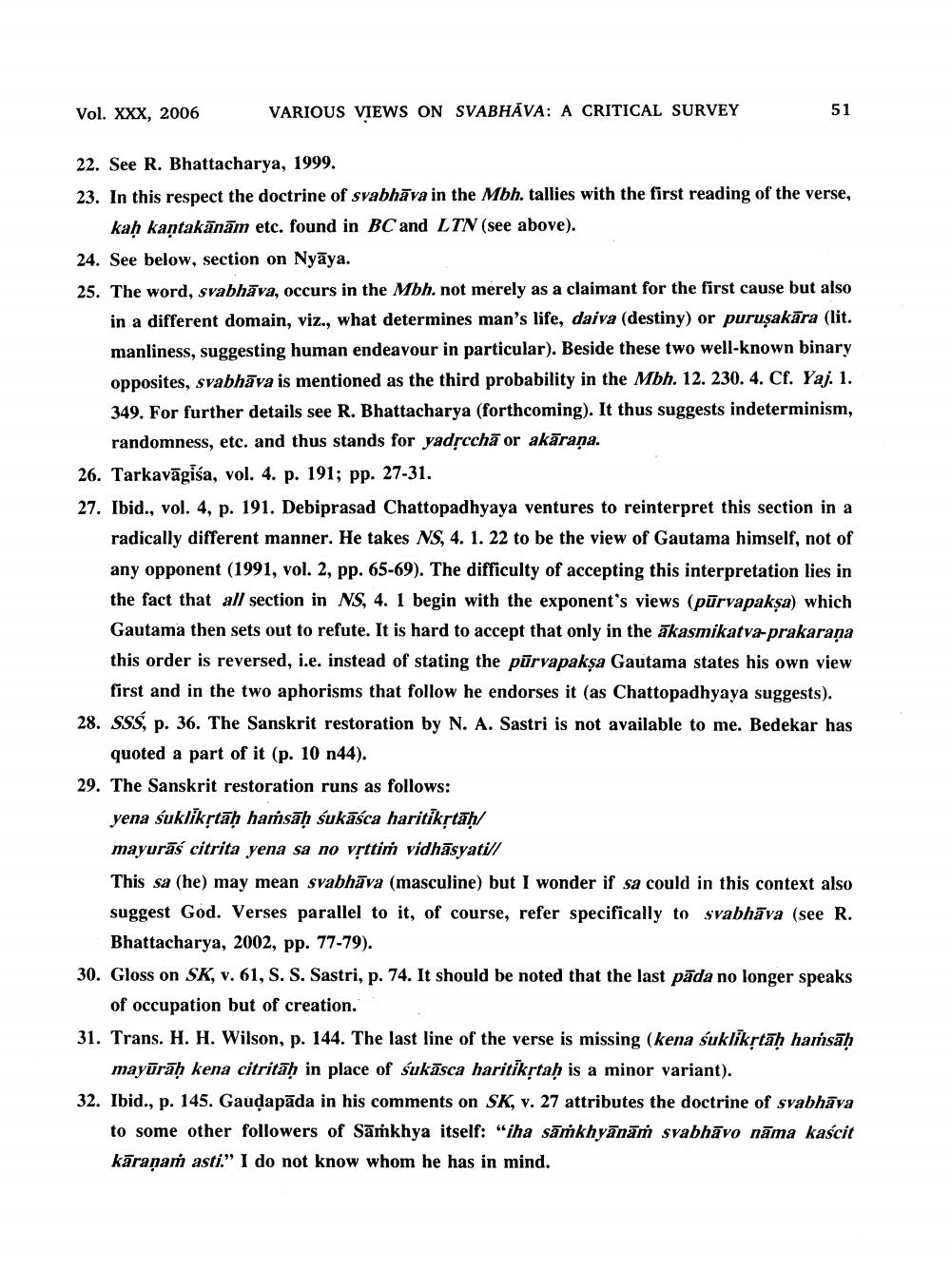________________
Vol. XXX, 2006
VARIOUS VIEWS ON SVABHĀVA: A CRITICAL SURVEY
51
22. See R. Bhattacharya, 1999. 23. In this respect the doctrine of svabhāva in the Mbh. tallies with the first reading of the verse,
kah kantakānām etc. found in BC and LTN (see above). 24. See below, section on Nyāya. 25. The word, svabhāva, occurs in the Mbh. not merely as a claimant for the first cause but also
in a different domain, viz., what determines man's life, daiva (destiny) or puruşakāra (lit. manliness, suggesting human endeavour in particular). Beside these two well-known binary opposites, svabhāva is mentioned as the third probability in the Mbh. 12. 230. 4. Cf. Yaj. 1. 349. For further details see R. Bhattacharya (forthcoming). It thus suggests indeterminism,
randomness, etc. and thus stands for yadscchā or akāraṇa. 26. Tarkavāgisa, vol. 4. p. 191; pp. 27-31. 27. Ibid., vol. 4, p. 191. Debiprasad Chattopadhyaya ventures to reinterpret this section in a
radically different manner. He takes NS, 4. 1. 22 to be the view of Gautama himself, not of any opponent (1991, vol. 2, pp. 65-69). The difficulty of accepting this interpretation lies in the fact that all section in NS, 4. 1 begin with the exponent's views (pūrvapakşa) which Gautama then sets out to refute. It is hard to accept that only in the ākasmikatva-prakarana this order is reversed, i.e. instead of stating the pūrvapakșa Gautama states his own view
first and in the two aphorisms that follow he endorses it (as Chattopadhyaya suggests). 28. SSS, p. 36. The Sanskrit restoration by N. A. Sastri is not available to me. Bedekar has
quoted a part of it (p. 10 n44). 29. The Sanskrit restoration runs as follows:
yena śuklikstāḥ haṁsāḥ śukāśca haritikstāḥ/ mayurās citrita yena sa no vșttim vidhāsyati// This sa (he) may mean svabhāva (masculine) but I wonder if sa could in this context also suggest God. Verses parallel to it, of course, refer specifically to svabhāva (see R.
Bhattacharya, 2002, pp. 77-79). 30. Gloss on SK, v. 61, S. S. Sastri, p. 74. It should be noted that the last pāda no longer speaks
of occupation but of creation. 31. Trans. H. H. Wilson, p. 144. The last line of the verse is missing (kena śuklikstāḥ haṁsāh
mayūrāḥ kena citritāḥ in place of śukāsca haritikstah is a minor variant). 32. Ibid., p. 145. Gaudapāda in his comments on SK, v. 27 attributes the doctrine of svabhāva
to some other followers of Sāṁkhya itself: "iha sāṁkhyānāṁ svabhāvo nāma kascit kāranaṁ asti." I do not know whom he has in mind.




